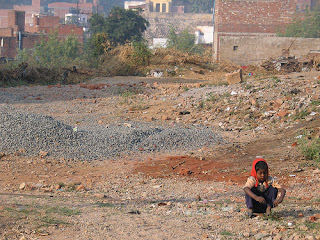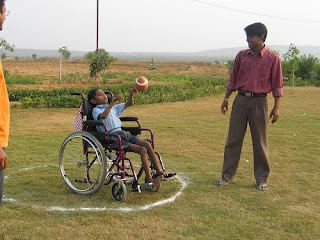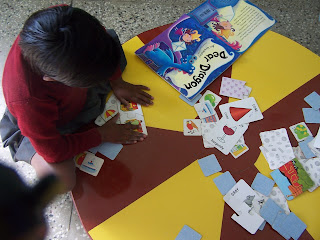In the very, very briefest of terms, I want to facilitate less of this:



and more of this:
.



Obviously, there’s more to it than that.
Can you imagine a girl so terrified, so neglected, so unaware of the good parts of the world, or of herself, that it’s all she can do to stand in front of you and quake? Can you imagine being beside the same girl, when she looks up at the paintings on a wall, and reaches towards them, taking three independent steps to run her hands along the contours? She stops, realising what she’s done, unsure, but she can’t contain her joy. I don’t have to imagine. I know.
Can you imagine a boy for whom everything is literal, being told that he ‘can’t tell’; a boy who, from that moment believes that he can’t speak? Can you imagine the frustration as he tries to communicate? Or the excitement over an awkwardly formed word, understood?
I have hundreds of these stories, of giving people chances; children and adults who need a little understanding, a little faith until they can find it for themselves. Capable, beautiful people whose needs are as ‘special’ as yours or mine. People whose tiny, gargantuan developments will lead to another, and another. It’s slow. There will be setbacks, and difficulties (how many times as a school-kid did you *think* you understood that rule of trigonometry, until you tried to apply it to another problem?) but there will be hundreds more moments like this. And each one makes the struggle worth it.
It’s not all about people with disabilities though. Far from it.
Worldwide, children are being left behind because of their gender or social position. Can you imagine getting up everyday, watching your brothers go to school, whilst your world does not extend beyond the village well? Can you imagine being told that, because your father cleans toilets, you’re going to clean toilets, too, for the rest of your life? What if your neighbours were the ones telling you? Your best friend? Your father and brothers? You want to be a teacher, a truck driver? So what; it’s not your place. How would you feel? It still happens, far, far more often than it should. And thus far, attempts at changing something so ingrained into people’s psyche, have made little more than a small dent in the way things are.
Often hand in hand with social class issues, come financial issues. Education is expensive in its own right, as westerners seeking higher education know. But not everywhere offers even basic primary education. Tuition fees, books and pens, uniforms and the cost of travel for those who cannot walk the distance between home and school, it all adds up. And what if your child brought in the few extra pennies which allowed the family to eat? Performed a vital part of the family’s workforce? Provided care for the smaller kids so that you yourself could work? What then?
And it shouldn’t stop when you reach 11, 16, 30. Imagine what a difference it would make to the street-cleaner who’s suddenly allowed the schooling he’s always dreamed of; the chance to learn a new profession, perhaps develop his own business. And would you rather be treated by the doctor with access to up-to-date research, or the doctor who’s not been sent so much as a single document, never mind refresher courses, for the last 20 years?
There are issues beyond getting people into education; there’s little point doing that if the service provided isn’t up to scratch.
Education will only provide opportunity, will only be accepted in the long term, if it’s relevant to the individuals and communities to whom it’s offered. What’s the good of trying to teach a group of people conversational English, before they have grasped their mother tongue? Or of lifting English curriculum into a rural African environment? Are they going be able to access the computers you talk about, afford their own cars to practise mechanics on? What will they gain from learning English history?
But what if you were to teach sustainable agricultural methods, teach business skills, teach African history, provide opportunities for developing minds to explore/ experiment with their own environments? What if you were to show the 'unteachable, dumb' population how their world works, how to relate to it and function within it to their maximum potential? What if you provide alternative methods of learning for those who can't focus on books?
Of course, to do any of this it has to be ensured that resources are in place; that they are not only there (you can’t learn to read without books, or to lay bricks without the materials to mix cement), but are used. I’ve worked in a limited-budget environment where, initially, every classroom resource was locked in the storeroom, because if items were finished, or broken, or lost, then management could no longer claim to be able to provide them. Backwards, maybe, and definitely missing the point, but a very real concern for many similar establishments.
Whatever ‘courses’ are provided, it has to be done in an appropriate, accessible way. Which means that the people heading any given course, must be properly trained. Teachers need to know their material and how best to present it. It’s no good expecting adults to do the same activities as a group of three-year-old’s, they tend not to view things in the same way. It’s no good trying to teach a practical skill with nothing but bookwork. Individuals have different learning styles, all of which need to be accommodated for. Information has to grab people’s attention, it has to stick. And presenting it in a variety of ways which promote independent discovery is not only more motivating for students, but develops analytical, problem solving skills valuable in the world today.
Learning by rote is heavily relied on in the majority of developing-countries’ schools. It disallows individual expression, knowledge which reaches further than the syllabus, or easy transferral to differing situations. It is, frankly, not only boring, but detrimental to persistently learn this way.
Having recently returned to the UK, I'm frequently brought close to tears - alternately elated and saddened - by the opportunities made available to individuals here; opportunities you will not find elsewhere. I'm not saying that the western world has it right. Far from it. I’ve worked with enough people whom the British systems have failed to understand and accommodate. But whilst not there yet, the western world is moving in the right direction. These people, amongst others, want to ensure that the rest of the world goes the same way. So do I.





2 comments:
This is a much, much better post than the first one and it's a really moving one too. Well done.
I just stumbled across your blog while hitting 'next blog' and it's a compelling read. All the very best with your work.
Post a Comment